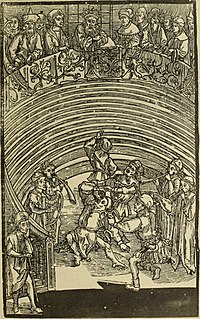Related Research Articles

Amyntas III was king of the Ancient Greek kingdom of Macedonia in 393 BC and again from 392 to 370 BC. He was the son of Arrhidaeus and grandson of Amyntas, one of the sons of Alexander I. His most famous son is Philip II, father of Alexander the Great.

The Peloponnesian War was an ancient Greek war fought between Athens and Sparta and their respective allies for the hegemony of the Greek world. The war remained undecided for a long time until the decisive intervention of the Persian Empire in support of Sparta. Led by Lysander, the Spartan fleet built with Persian subsidies finally defeated Athens and started a period of Spartan hegemony over Greece.

The 5th century BC started the first day of 500 BC and ended the last day of 401 BC.
Year 431 BC was a year of the pre-Julian Roman calendar. At the time, to Romans it was known as the Year of the Consulship of Cincinnatus and Mento. The denomination 431 BC for this year has been used since the early medieval period, when the Anno Domini calendar era became the prevalent method in Europe for naming years.

Year 323 BC was a year of the pre-Julian Roman calendar. At the time, it was known as the Year of the Consulship of Longus and Cerretanus. The denomination 323 BC for this year has been used since the early medieval period, when the Anno Domini calendar era became the prevalent method in Europe for naming years.
This article concerns the period 459 BC – 450 BC.
This article concerns the period 349 BC – 340 BC.
This article concerns the period 439 BC – 430 BC.
This article concerns the period 429 BC – 420 BC.
This article concerns the period 369 BC – 360 BC
Year 446 BC was a year of the pre-Julian Roman calendar. At the time, it was known as the Year of the Consulship of Barbatus and Fusus. The denomination 446 BC for this year has been used since the early medieval period, when the Anno Domini calendar era became the prevalent method in Europe for naming years.

Brasidas was the most distinguished Spartan officer during the first decade of the Peloponnesian War who fought in battle of Amphipolis and Pylos. He died during the Second Battle of Amphipolis while winning one of his most spectacular victories.

Perdiccas II was a king of Macedonia from c. 448 BC to c. 413 BC. During the Peloponnesian War, he frequently switched sides between Sparta and Athens.

The Battle of Naupactus was a naval battle in the Peloponnesian War. The battle, which took place a week after the Athenian victory at Rhium, set an Athenian fleet of twenty ships, commanded by Phormio, against a Peloponnesian fleet of seventy-seven ships, commanded by Cnemus.

The Battle of Potidaea was fought in 432 BC between Athens and a combined army from Corinth and Potidaea, along with their various allies. Along with the Battle of Sybota, it was one of the catalysts for the Peloponnesian War.

Phormio, the son of Asopius, was an Athenian general and admiral before and during the Peloponnesian War. A talented naval commander, Phormio commanded at several famous Athenian victories in 428 BC, and was honoured after his death with a statue on the acropolis and a state funeral. He is considered one of Athens' many great admirals, alongside Themistocles and Cimon.
The First Peloponnesian War was fought between Sparta as the leaders of the Peloponnesian League and Sparta's other allies, most notably Thebes, and the Delian League led by Athens with support from Argos. This war consisted of a series of conflicts and minor wars, such as the Second Sacred War. There were several causes for the war including the building of the Athenian long walls, Megara's defection and the envy and concern felt by Sparta at the growth of the Athenian Empire.
The Battle of Rhium or the battle of Chalcis was a naval battle in the Peloponnesian War between an Athenian fleet commanded by Phormio and a Peloponnesian fleet composed of contingents from various states, each with its own commander. The battle came about when the Peloponnesian fleet, numbering 47 triremes, attempted to cross over to the northern shore of the Gulf of Patras to attack Acarnania in support of an offensive in northwestern Greece; Phormio's fleet attacked the Peloponnesians while they were making the crossing.
Aristeus, son of Adeimantus, was a Corinthian general who commanded the expedition to Potidaea in 432 BC. After the Athenians broke a truce with the Corinthians at Sybota, his primary goal was to defend Potidaea from an Athenian attack. He then went on to defend the Corinthian colony from Athens during the Battle of Potidaea in 432 BC, until he was left with no option but to leave the colony with the Chalcidians. In 430 BC he traveled to Thrace with Spartan envoys where they were discovered by Athenians and brought to Athens, by Athenian ambassadors, where they were promptly killed without a trial. After Aristeus' death, Athens seized Potidaea in 430/429 BC during the Peloponnesian War, the battles of Sybota and Potidaea being two main catalysts for the war.

Cnemus was the Spartan fleet commander during the second and third years of the Archidamian War. During his command, Cnemus oversaw a series of operations that met with failure. As a result, the Spartans began to question Cnemus' leadership and sent several advisers to assist him in his command.
References
- ↑ C. Michael Hogan, Cydonia, The Modern Antiquarian, Jan. 23, 2008
- ↑ William Spry Robinson, A Short History of Greece, 1895, Macmillan and Co., 392 pages